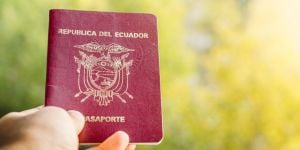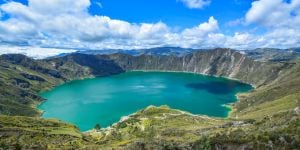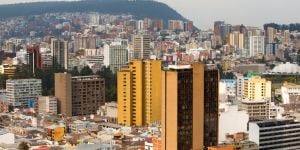Property Valuation methodology for investors' visa
Subscribe to the topic
Post new topic
Hello to all and many thanks for the excellent information here. I did a search before starting this thread and didnt find anything so hopefully someone can shed some light.......
I am currently in Tena and have been here for almost 5 months on a 12 IX visa. I have been looking at property outside of the city with the idea of building a retirement home and having a small farm.
Since I have to date done all of my visa work here and elsewhere on my own i.e. not having an attorney, I called myself doing research on the investors visa. A couple of weeks ago someone here mentioned that the government values purchased property using the valuation in the municipality where the property is registered and not the purchase price. From what I have been able to find out, this is much less than what might be the sale price. If anyone can shed light on this it would be deeply appreciated.
I also understand that one may deposit $25,000 here in Ecuador to qualify for this visa. Is this in ones own account or must it be in a government bond or special account...and does one have access to these funds? Additionally if one decides one wants to leave Ecuador at some point are these funds easily transferable back to an account in ones' home country(in my case the USA). Someone here commented there was a penalty for transferring funds out of Ecuador.
After I found out about the valuation question I wrote a law firm in Quito asking these questions. Apart from a very cursory reply about possibility of renewing the 12 IX visa, they didnt touch on any of the other questions and have subsequently ignored a follow up e mail.
Any pointers or comments would be deeply appreciated.
Regards from Tena
Expat42451
It is my understanding that you can deposit $25,000 in a savings account or CD in an Ecuador institution, but as soon as you withdraw enough to lower the balance to less than $25,000, then your visa is over unless you purchased both property beforehand worth at least $25,000. There is a 5% penalty for taking money out of Ecuador. If you go the $25,000 in the bank route, you better make sure that it is a place that has deposit insurance, remembering that higher interest rates means higher risk. Recently a place went under, had to deposit insurance, and the govt. said they would not be helping out, emphasizing the buyer beware principle.
Mugtech
Thanks very much for the information both on the deposit and the property requirement. I have visited the Ecuadorian government immigration site and I have not found mention anywhere of the 5% penalty. Someone else I know here warned me about that. Thanks very much for confirming it.
Additionally I did not see anywhere on the immigration site what I mentioned in my original post about the valuation being the appraised value of the property rather than the purchase price. It is probable that I did not do sufficient research on this. So far its been bits and pieces of information from various sources to put the picture together. Would have been nice for all of this to have been clarified on the government site but there exists the possibility that I missed it as well.
Thank you also for the reminder on checking for deposit insurance. From what I am learning, if one put money in a bank without insurance for the purpose of the visa and the bank went into insolvency, then the visa would be no longer valid.
Warmest Regards from Tena and many thanks for the kind interest
Expat42451
As I understand it, it is based on the government's assessment of the property, not the purchase price. I recently looked at a property in Mompiche. The original lot was purchased for $6000. The ex-pat who bought it then went to the municipality and requested the property assessment be adjusted up to $25000. The municipality happily cooperated because it means more tax revenue for them. She was then able to get her visa using the adjusted property value. I would not assume all municipalities are as cooperative, or that all properties are valued lower than the sale price. I picked up my land for half the municipality's official value.
Thanks very much for the information. It has been inferred that the municipality here would do much the same if I request it. Unfortunately I am almost out of time on this 6 month visa so it looks like I will start again in 6 months.
Thanks for sharing this experience.
Expat42451
Please, dont forget to bring FBI report along to your papperwork!
They start asking for this a few months ago. Needs to apostille.
Be sure your name is correctly spell it. Get the translation in Ecuador. They refuse other translations even if it notarized! This happen to my husband and was a wasted money.
About the value property, just you ask at the municipality that you want to value it at 25k for your visa and they will help you. This is not a problem at all.
Have a safe trip!!
jessekimmerling wrote:As I understand it, it is based on the government's assessment of the property, not the purchase price. I recently looked at a property in Mompiche. The original lot was purchased for $6000. The ex-pat who bought it then went to the municipality and requested the property assessment be adjusted up to $25000. The municipality happily cooperated because it means more tax revenue for them. She was then able to get her visa using the adjusted property value. I would not assume all municipalities are as cooperative, or that all properties are valued lower than the sale price. I picked up my land for half the municipality's official value.
Hi jesse,
It is amazing.. Like Municipality can happily give more assessed price so that you can have your investor visa..... But then accordingly how much tax one has to give???
Buying a property more safe for investment or keeping money in Bank?
Regards
ODAN wrote:jessekimmerling wrote:As I understand it, it is based on the government's assessment of the property, not the purchase price. I recently looked at a property in Mompiche. The original lot was purchased for $6000. The ex-pat who bought it then went to the municipality and requested the property assessment be adjusted up to $25000. The municipality happily cooperated because it means more tax revenue for them. She was then able to get her visa using the adjusted property value. I would not assume all municipalities are as cooperative, or that all properties are valued lower than the sale price. I picked up my land for half the municipality's official value.
Hi jesse,
It is amazing.. Like Municipality can happily give more assessed price so that you can have your investor visa..... But then accordingly how much tax one has to give???
Buying a property more safe for investment or keeping money in Bank?
Regards
Taxes here are negligable untill you start getting into larger pieces of land.
My personal opinion is that it's better to buy land, but I'm no expert on Ecuadorian banks and CDs.
I agree it is always better (provided you do not get raped on the purchase price) to buy land.
When I did the exploration I did here in Tena- I was told that the annual tax on property valued at $25,000 is $250. However this is word of mouth only, I have nothing written to prove this....nor have I seen anything in writing stating what the tax rate is on the valuation.
I did run into something here on taxes that I found interesting. When buying rural or agricultural land I am told that there are no taxes on anything under 29 hectares- above 29 hectares you are taxed on the entire amount of land, not solely the excess i.e. 28 hectares, no tax. 31 hectares, tax on 31 hectares. I also understand from several farmers I talked to here that their tax rates are extremely low- one with 50 hectares indicated he paid less than $200 per year.
Unfortunately my visa (12IX) expires October 26th and I have run out of time here so it looks like out of the country for 6 months. I verified with several people that the visa can not be renewed and have been told that I can not re enter Ecuador within days or weeks on a tourist visa.
I thought I would post what I have since learned on valuation and taxes as a help to others who hopefully wont have to waste the time I have finding out what exists locally i.e. in Tena.
Regards and good travels and luck to all
Expat42451
expat42451 wrote:I agree it is always better (provided you do not get raped on the purchase price) to buy land.
When I did the exploration I did here in Tena- I was told that the annual tax on property valued at $25,000 is $250. However this is word of mouth only, I have nothing written to prove this....nor have I seen anything in writing stating what the tax rate is on the valuation.
I did run into something here on taxes that I found interesting. When buying rural or agricultural land I am told that there are no taxes on anything under 29 hectares- above 29 hectares you are taxed on the entire amount of land, not solely the excess i.e. 28 hectares, no tax. 31 hectares, tax on 31 hectares. I also understand from several farmers I talked to here that their tax rates are extremely low- one with 50 hectares indicated he paid less than $200 per year.
Unfortunately my visa (12IX) expires October 26th and I have run out of time here so it looks like out of the country for 6 months. I verified with several people that the visa can not be renewed and have been told that I can not re enter Ecuador within days or weeks on a tourist visa.
I thought I would post what I have since learned on valuation and taxes as a help to others who hopefully wont have to waste the time I have finding out what exists locally i.e. in Tena.
Regards and good travels and luck to all
Expat42451
Thanks expat42451... for lovely information...
There is a way that you can know how much tax are you going to pay..
When you ask for price, ask for the papperwork and ask to they let you check the "Impuesto Predial" You will see how much that person pays every year.
FB GoodLifeInEcuador.
MariaPiaBlog wrote:There is a way that you can know how much tax are you going to pay..
When you ask for price, ask for the papperwork and ask to they let you check the "Impuesto Predial" You will see how much that person pays every year.
FB GoodLifeInEcuador.
Thanks Maria
MariaPiaBlog wrote:There is a way that you can know how much tax are you going to pay..
When you ask for price, ask for the papperwork and ask to they let you check the "Impuesto Predial" You will see how much that person pays every year.
FB GoodLifeInEcuador.
Thanks Maria, that's a valuable bit of info.
expat42451 wrote:A couple of weeks ago someone here mentioned that the government values purchased property using the valuation in the municipality where the property is registered and not the purchase price. From what I have been able to find out, this is much less than what might be the sale price.
Be careful that you are not paying a highly inflated price for property. You don't want to be caught buying at the top of a real estate bubble. Narcos are using Ecuador to clean up their U$D through real estate, causing over inflated prices. The government is currently looking at legislation to control that, so prices may be coming down in the next few years.
Generally, real estate is worth 100 to 125 times monthly rent. Look at what locals are paying to rent an equivalent property. You don't want to be paying more then 100 to 125 times that.
Defuera
This is excellent information for everyone. I for one have been here for almost 6 months on a 12 IX visa- I am headed for Quito tomorrow to catch a plane out of the country because the visa expires in a couple of weeks but...... this will be good to know if and when I come back.
I am the original poster of this thread and I find that there is a lot of bad information around and-- lots of "hidden" information as well, whether hidden purposely or inadvertently I do not know. There are also a lot of charlatans and hucksters who paint a much different picture than what actually exists. I have had best luck asking here on the forum rather than elsewhere, many times, even locally.
I originally considered property near the coast in several places- Montanita, Canoa, Bahia among them and found prices much higher than what I was led to believe reading various online "services" run by promoters to lure outsiders in to purchase property. I didn't subscribe to any of them . I ve seen several others from the US and elsewhere who have had really bad luck in listening to a lot of the "gurus" and not doing their own diligence....some who have even lost goodly sums of money in efforts to live here permanently.
I ve spent the last 5 months in Amazonia, my second time in country in a little over a year, doing the diligence I felt necessary before investing in a culture where I am not a native.......a number of people I have met ask when or if I would be returning to Ecuador. At this point I do not know. What I have experienced here in Tena hasnt left the best taste in my mouth so its up in the air whether I want another run at this or not. Your post is excellent and should be deeply appreciated by both those in country investigating the purchase of property or those in the US reading this.
Thanks very much
Expat
expat42451 wrote:I agree it is always better (provided you do not get raped on the purchase price) to buy land.
When I did the exploration I did here in Tena- I was told that the annual tax on property valued at $25,000 is $250. However this is word of mouth only, I have nothing written to prove this....nor have I seen anything in writing stating what the tax rate is on the valuation.
I did run into something here on taxes that I found interesting. When buying rural or agricultural land I am told that there are no taxes on anything under 29 hectares- above 29 hectares you are taxed on the entire amount of land, not solely the excess i.e. 28 hectares, no tax. 31 hectares, tax on 31 hectares. I also understand from several farmers I talked to here that their tax rates are extremely low- one with 50 hectares indicated he paid less than $200 per year.
Unfortunately my visa (12IX) expires October 26th and I have run out of time here so it looks like out of the country for 6 months. I verified with several people that the visa can not be renewed and have been told that I can not re enter Ecuador within days or weeks on a tourist visa.
I thought I would post what I have since learned on valuation and taxes as a help to others who hopefully wont have to waste the time I have finding out what exists locally i.e. in Tena.
Regards and good travels and luck to all
Expat42451
I think you're mostly correct in your information about taxes on rural properties. My 91 hectares is taxed based on it's size, not it's value. My taxes are a little over $900 per year. I don't know how much of that is federal, and how much is local.
defuera wrote:Be careful that you are not paying a highly inflated price for property. You don't want to be caught buying at the top of a real estate bubble. Narcos are using Ecuador to clean up their U$D through real estate, causing over inflated prices.
I noticed this too. In a lot of rural areas Columbians have bought up much of property.
[moderated: free advertisement is not allowed on the forum + pls recommend her on the business directory. Thank you]
Articles to help you in your expat project in Ecuador
 The Working Holiday Visa for Ecuador
The Working Holiday Visa for EcuadorEcuador is truly a paradise for adventure and nature lovers, and thanks to the Working Holiday Visa program, they ...
 Permanent Residency in Ecuador
Permanent Residency in EcuadorEcuador is calling and you are ready to go and experience all that this gorgeous country has to offer. However, ...
 Getting Visas in Ecuador
Getting Visas in EcuadorFirst, do not be afraid of the Visas process. It is only a process of providing documents, getting them ...
 Resident Visas in Ecuador
Resident Visas in EcuadorRESIDENT VISAS IN ECUADOR - GENERAL INFORMATION
 General visa requirements in Ecuador
General visa requirements in EcuadorEcuador's visa policy, one of the world's most lenient, makes it easy for tourists from almost all the countries ...
 Food in Ecuador
Food in EcuadorWhat kind of food will you find in restaurants, cafes, and private homes in Ecuador? Many restaurants in Ecuador ...
 Opening a bank account in Ecuador
Opening a bank account in EcuadorA few years back, an expat would just breeze into an Ecuadorian bank, flash their passport and a bank account ...
 Healthcare in Ecuador
Healthcare in EcuadorEcuador, as a fast-developing nation, has laws that are constantly evolving, but one thing is certain: the ongoing ...
Find more topics on the Ecuador forum




